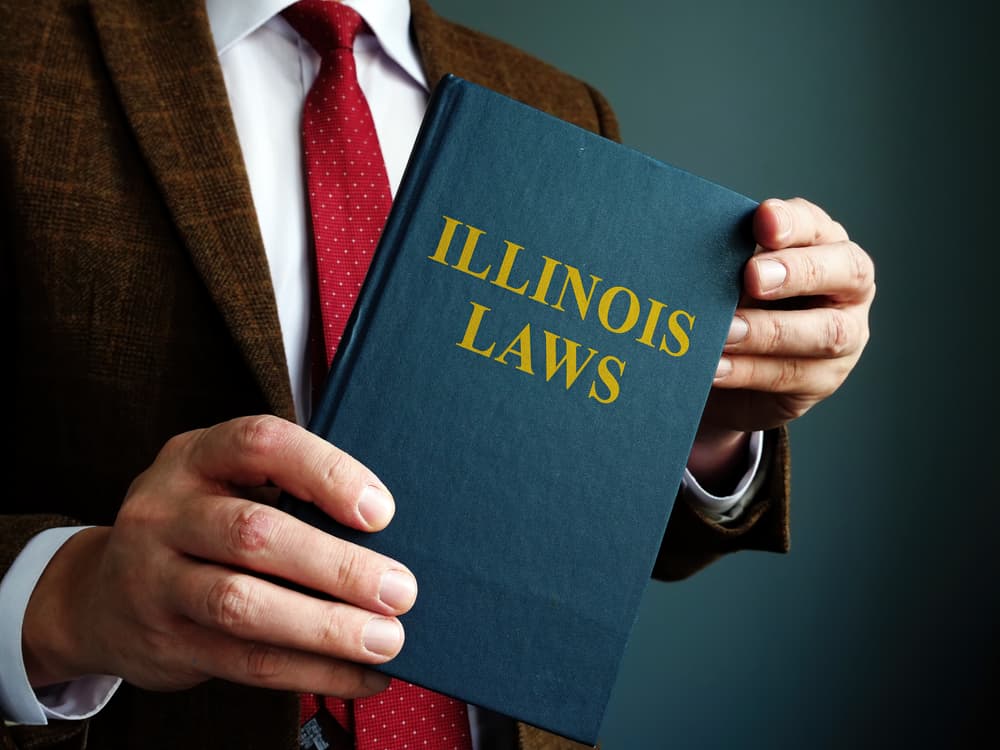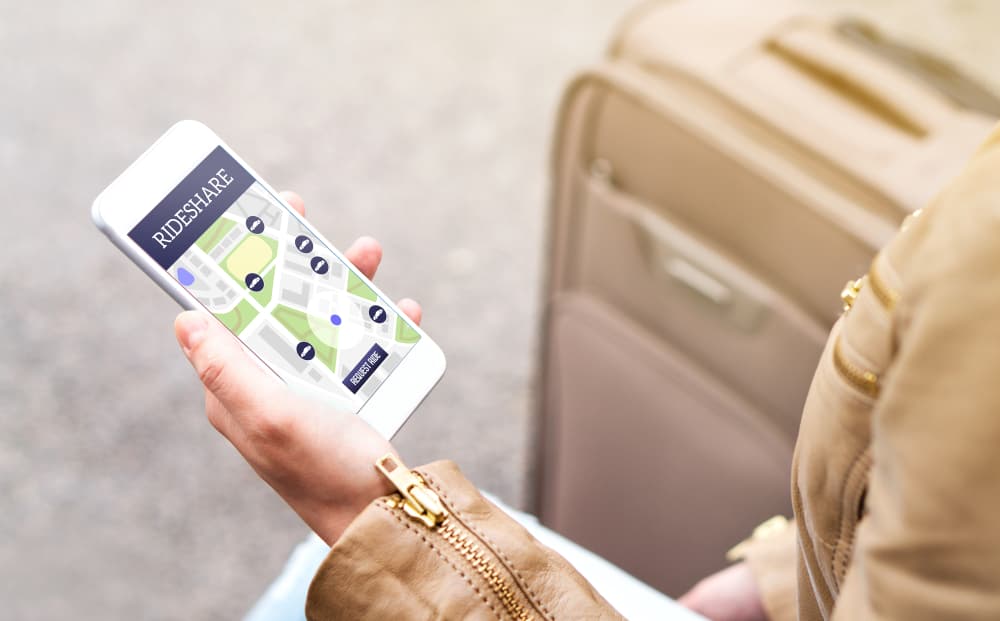You tap an app, a car shows up, and you're on your way. Simple, right? Well, mostly. Until an accident happens.
If someone’s negligence is responsible for your rideshare accident, figuring out who is responsible and, more importantly, what are Illinois’ laws on rideshare accidents, quickly turns into a complicated mess.
Generally, Illinois law has very specific requirements for rideshare companies, particularly concerning insurance coverage. Beyond that, the familiar rules about negligence—who messed up and how—will heavily influence any accident claim.
The Chicago lyft accident lawyers at LegalRideshare Injury Lawyers is here to help you make sense of the legal process. Give us a call at (312) 767-7950 for a free consultation to discuss your situation.
General Overview of Illinois Rideshare Law

One of the foundational pieces of legislation, the Illinois Transportation Network Providers Act (ITNPA), continues to be the main rulebook for rideshare companies operating statewide. This Act lays down the essential ground rules, from insurance minimums to basic driver qualifications.
Beyond state-level laws, major cities often have their own specific takes on regulating rideshares. Chicago, for instance, has its own set of ordinances that apply to Transportation Network Providers (TNPs)—the official term for rideshare companies. These local rules dig into the nitty-gritty of operations within city limits, like specific requirements for vehicle inspections, more detailed driver background check processes, and particular rules for how rideshares can operate at airports or other busy hubs.
Key Illinois Laws and Regulations for Rideshare Accidents
Transportation Network Providers Act (ITNPA)
This is the big one at the state level. The ITNPA specifically targets rideshare companies and sets out clear rules for their operation in Illinois (625 ILCS 57/1 et seq.)
- Insurance Requirements: This is a cornerstone of the Act. The ITNPA mandates that TNCs or their drivers carry specific types and amounts of insurance. The coverage requirements are tiered, changing based on the driver's status:
- App on, waiting for a request: When a driver is logged into the app but hasn't accepted a ride request yet, lower levels of liability coverage are typically required.
- En route to pick up a passenger / Transporting a passenger: This is when the higher coverage limits kick in. During a prearranged ride (from the moment a driver accepts a ride request until the passenger exits the vehicle), the law generally requires a minimum of $1,000,000 in liability coverage for death, bodily injury, and property damage. This substantial coverage is designed to protect passengers and other road users.
- Driver Requirements: The Act sets specific criteria for rideshare drivers beyond simply owning a car. It sets forth minimum qualifications, including age limits. Crucially, it also mandates background check protocols to enhance passenger safety. These checks typically screen for criminal history and driving record issues.
- Vehicle Requirements: Safety extends to the vehicles themselves. Cars used for TNC services must meet Illinois' standard safety and emissions requirements. This means regular inspections and upkeep to ensure they are roadworthy.
City of Chicago Municipal Code, Chapter 9-115
If your rideshare accident happens in Chicago, an additional layer of local rules applies. Chapter 9-115 of the city's Municipal Code lays out specific regulations for TNPs operating within the city's boundaries.
This ordinance covers a range of areas:
- Licensing of TNP companies themselves to operate in Chicago.
- More stringent or specific vehicle inspection requirements than the state might mandate.
- Detailed rules for how rideshares can operate at O'Hare and Midway airports, as well as other designated zones like McCormick Place. This includes pick-up and drop-off procedures.
Minimum Auto Insurance Requirements
It's also important to remember the baseline. All drivers in Illinois, including rideshare drivers when they are not covered by the TNC's commercial policy (for instance, when their rideshare app is completely off and they are driving for personal reasons), must meet the state's minimum liability insurance requirements. According to 625 ILCS 5/7-203, these minimums are currently:
- $25,000 for injury or death to one person in an accident.
- $50,000 total for injury or death per accident (if multiple people are injured).
- $20,000 for property damage.
Important Legal Concepts in Illinois Rideshare Accidents

Beyond specific statutes, certain fundamental legal principles govern how blame is assigned and compensation is awarded after any vehicle accident, including those involving rideshares.
Negligence
This is the big one in most personal injury cases. To recover damages (that is, get compensation for your losses), you generally need to show that someone else was negligent.
So, what does "negligence" actually mean in plain English? It's a failure to use the level of care that a reasonably careful person would have used in the same situation. If that failure directly caused your injuries and losses, then negligence is established.
Examples of driver negligence could include:
- Speeding or reckless driving.
- Driving under the influence of alcohol or drugs.
- Distracted driving (e.g., texting while driving).
- Running a red light or stop sign.
- Failing to yield the right-of-way.
Modified Comparative Negligence
Life isn't always black and white, and sometimes, more than one person might share some blame for an accident. Illinois uses a "modified comparative negligence" rule, as laid out in 735 ILCS 5/2-1116. This means if you are found to be partially at fault for the accident, you still potentially recover damages from another at-fault party. However, your total compensation will be reduced by your percentage of fault.
Here's the critical part of "modified" comparative negligence: if you are found to be more than 50% at fault for the accident, you cannot recover any damages at all in Illinois. So, if a court or jury decides you were 51% responsible, you get nothing. If you were 20% at fault, your awarded damages would be reduced by that 20%. For instance, if your total damages were $100,000, but you were 20% at fault, you could recover $80,000.
Vicarious Liability
This legal doctrine, sometimes called "respondeat superior" (a Latin term meaning "let the master answer"), makes an employer or principal responsible for the wrongful actions of their employee or agent. This applies if those wrongful acts happened while the employee or agent was working within the scope of their employment or agency.
In the context of rideshare accidents, this gets tricky. Rideshare companies like Uber and Lyft have historically classified their drivers as independent contractors, not employees. This distinction is significant because, traditionally, companies are less likely to be held vicariously liable for the negligence of independent contractors compared to employees. The ITNPA itself includes language stating that TNCs are not deemed to own, control, operate, or manage the vehicles used by TNC drivers, and are not common carriers. This language tends to shield them from direct liability for a driver's negligent actions under this doctrine.
However, this is an area of ongoing legal debate and legislative scrutiny nationally and in Illinois. There have been, and continue to be, legal challenges and proposed legislation aiming to reclassify drivers or impose more direct responsibility on the TNCs. How vicarious liability might apply in an Illinois rideshare accident case is a very complex question, often depending on the specific facts and the current state of the law, which may change unexpectedly. We always advise consulting an attorney for the most accurate and up-to-date information for your case.
FAQ for What Are Illinois’ Laws on Rideshare Accidents
What if the rideshare driver’s personal insurance denies my claim?
This is a frequent concern. A driver's personal auto insurance policy often contains an exclusion for "commercial use" or "driving for hire." If the driver was logged into the rideshare app and actively working (either en route to a passenger or transporting one) when the accident occurred, their personal policy will likely deny the claim based on this exclusion.
That's precisely why the Illinois Transportation Network Providers Act (ITNPA) mandates that rideshare companies (TNCs) provide commercial insurance coverage. This TNC policy is generally designed to be primary coverage when the driver is engaged in rideshare activities. So, if the personal policy says no, the TNC's insurance should typically step in, provided all the legal requirements for that coverage period are met (e.g., the driver was logged in and on a prearranged ride).
Are there time limits for filing a rideshare accident claim in Illinois?

Yes, absolutely. Illinois, like all states, has laws called "statutes of limitations." These laws set strict deadlines for filing lawsuits. For most personal injury cases in Illinois, including those arising from car accidents (rideshare or otherwise), the statute of limitations is generally two years from the date of the injury.
If you fail to file a lawsuit within this two-year window, you will almost certainly lose your right to sue for damages, regardless of how strong your case might have been. There are very limited exceptions to this rule, but banking on an exception is risky. That's why it's so important to act promptly and not delay in seeking legal advice if you've been injured.
What if I was a passenger in a rideshare vehicle that another driver hit?
If you were a passenger in an Uber or Lyft and your vehicle was struck by another driver (who was not your rideshare driver), the primary source of recovery would typically be the at-fault driver's auto insurance. You would file a claim against that driver's policy for your injuries and damages.
However, what happens if that at-fault driver is uninsured (has no insurance) or underinsured (has insurance, but the policy limits aren't enough to cover your damages)? This is where the rideshare company's insurance comes back into play. The ITNPA requires TNCs to carry uninsured/underinsured motorist (UM/UIM) coverage. As a passenger, you make a claim under this UM/UIM portion of the rideshare company's policy if the at-fault third-party driver cannot cover your losses.
Do I need a lawyer if I was in a rideshare accident in Illinois?

Rideshare accident cases are significantly more complex than a typical two-car collision. You're often dealing with multiple insurance policies (the driver's personal policy, the TNC's various commercial policies depending on the driver's status), and multiple potentially liable parties. The question of what are Illinois’ laws on rideshare accidents, and how they apply to your case, is not simple to answer without legal background.
An attorney experienced with these types of cases helps you understand your rights, determine which insurance policies apply, investigate the accident, gather evidence, negotiate with insurance companies (who are often looking to minimize payouts), and, if necessary, represents you in court. They work to ensure you pursue all avenues for the compensation you may be entitled to.
What kind of damages can I recover after a rideshare accident?
If you're injured in a rideshare accident due to someone else's negligence, you recover compensation for a variety of losses, commonly referred to as "damages." The specific types and amounts will depend heavily on the details of your case, the severity of your injuries, and the impact on your life. Common categories of damages include:
- Medical Expenses: This covers everything from emergency room visits and hospital stays to surgeries, doctor's appointments, physical therapy, medications, and any future medical care you might need.
- Lost Wages: If the accident and your injuries caused you to miss work, you can claim the income you lost. This also includes loss of future earning capacity if your ability to work is permanently affected.
- Pain and Suffering: This compensates for the physical pain, emotional distress, and mental anguish caused by the accident and your injuries.
- Disability or Disfigurement: If you suffer permanent disabilities, scarring, or disfigurement, you are entitled to compensation for these long-term impacts.
- Property Damage: If any of your personal property was damaged in the accident (like your phone or laptop if you were a passenger), you could claim its repair or replacement cost.
An attorney helps you identify and calculate all potential damages applicable to your situation.
What if I was a pedestrian or bicyclist hit by a rideshare vehicle?
If a rideshare vehicle hit you while you were walking or cycling, the same general legal principles of negligence and insurance coverage discussed earlier would apply. You would need to determine who was at fault for the accident (the rideshare driver, or perhaps another party contributing to the crash).
The applicable insurance coverage would then depend on the rideshare driver's status at the time of the accident (app off, app on waiting for a request, or en route/transporting a passenger). The tiered insurance structure mandated by the ITNPA would come into effect. As a vulnerable road user, your injuries could be severe, making it even more important to understand which insurance policies are available to cover your significant medical bills, lost income, and other damages
Navigate Your Rideshare Accident Claim with LegalRideshare Injury Lawyers
The team at LegalRideshare Injury Lawyers is here to provide clarity and support. We take on the burden of dealing with insurance companies and the legal complexities, allowing you to focus on your recovery.
If an Illinois rideshare accident has impacted your life, reach out to us. Let us help you make sense of it all. Call rideshare accident attorneys today at (312) 767-7950 for a free, no-obligation consultation.